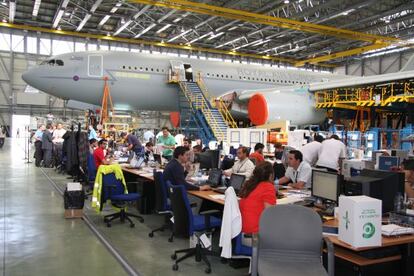Capital goods sector remains cautious over overseas growth
The increase in exports has generated guarded optimism in the industry

Francisco Purroy didn't stop last week. On Thursday he received visitors from Australia. The day before that he saw a group of potential Chinese customers. Friday was the turn of the Brazilians. All of them were interested in a piece of high-performance food-processing machinery manufactured by Hiperbaric. "Perhaps we won't seal deals now, but we will within a year," Purroy, who is Hiperbaric's head of sales, says after saying goodbye to the Australians at the entrance to Hiperbaric's factory in the Burgos area.
As a Spanish brand, Hiperbaric is light years away from the more glamorous and popular likes of Zara and Mango. It is largely unknown to the public. But in its niche market of post-pasteurization using high-pressure processing to rid food of microbes, it is in the vanguard. It is locked in a battle with a US rival and is trying to shake off two new competitors, one from Germany and the other Chinese. The company has annual sales of around 40 million euros and exports more than 90 percent of its output.
Like most of the companies in the capital goods sector in Spain, its brand is unknown to the public and even to workers and other companies in the rest of a sector that continues to look overseas as the crisis drags on in Spain.
"The situation in the capital goods sector is not good, but we're in a process of transition that is bringing in positive elements and we're hopeful that in 2013 we will see an improvement and leave behind this general air of despondency," says Antonio Garciapons, the general manager of Sercobe, the association that groups together capital goods companies that include manufacturers of machinery and trains and rolling stock, as well as aeronautical material, among other things.
We're a First Division team, but in Spain we don't have a league"
Companies that make up Sercobe saw their combined revenues fall 2.8 percent last year, particularly as a result of the depressed state of the Spanish market. That fall in turnover was accompanied by a drop of over 10 percent in the industrial production index. The impact in the decline in private investment was accompanied by the non-existence of new public sector projects in areas such as transportation, while investment in electricity production and distribution has also fallen dramatically as a result of the fall in consumption and the fallout from the so-called tariff deficit - the difference between what it costs to produce electricity and regulated rates charged for it.
"We're a First Division team, but with the problem that in Spain we don't have a league and have little visibility," Garciapons laments. "We manufacture a line of products that does not emerge rapidly, but we are very much technology-based and we're now on the global frontline," he adds.
Economy Minister Luis de Guindos recently gave the sector something of a lift when he underlined its importance in the context of Spanish exports. In the first two months of the year, overseas shipments from the sector climbed 17.7 percent from a year earlier and represented a fifth of total exports. Companies in the industry on average export the equivalent of 85 percent of their turnover. "The figures are way above the average growth in exports, but to conclude on that basis that we are undergoing a change in trend or that we have transformed our business is getting a little bit ahead of ourselves," says Pere Puig, who helps run the Multinational Company Observatory at the Esade Business School.
Ulma Packaging, a company that specializes in packaging systems and machinery, has seen a jump in activity over the past two quarters. Between October of last year and March of this year, its order book climbed 22 percent compared with the same period a year earlier. "It's true there has been significant growth, but the cycle hasn't changed," says commercial manager Iñaki Zubía. "If only that were the case."
Overseas shipments from the sector represent a fifth of total exports
In general terms, the international markets where Ulma is experiencing the most growth coincide with those of the rest of the sector: Brazil, Mexico, the United States, and in Europe, Russia and Poland. "The traditional European markets are not growing," Zubía says.
The downplaying of the significance of recent growth is common within the sector. "Sales of capital goods are high value, and that can distort the figures," says Joan Tristany, general manager of the Amec association of exporting companies. As with Zubía, Tristany highlights the importance of the capital goods sector for the economy as a whole. "It's not the same thing to export basic agricultural products as it is to export airplane parts," he says. "Capital goods not only involve production and sales, they also call for and generate skilled labor."
The sector as a whole has also had to make its mind up about what direction it wants to go in. "We have had to ask ourselves if we want to fly the flag of German quality or enter the market with Chinese-level pricing, and we have reached the conclusion that we want to do both," says Amec's Tristany.
However, individual companies do not see the debate as being that simple and point out that everything doesn't work according to what Spanish firms want. "The Germans are cutting their prices in reaction to a downward market and the Chinese are greatly improving the quality of their products," says Ulam's Zubía. In his opinion, the challenges lie not only in pricing and the product itself but in creating an integrated offer that includes assessment, manufacturing and maintenance.
Despite the fact that Ulma Packaging's annual turnover is close to 150 million euros, it would like to see incentives for the sector and to recover some of the assistance that has disappeared as a result of the government's austerity drive.
"The aid offered by the ICEX [Spanish Institute of Foreign Trade] would be of great help to us at present as would the support of the banking sector to finance projects," says Zubía, arguing that the absence of such assistance has become a comparative disadvantage for Spanish companies.
"We compete with companies in the rest of Europe that don't have the same problems," Pere Puig says in agreement with Zubía. Puig also calls for a greater effort to be made in training personnel.
Garciapons believes the lack of funding is a serious obstacle for a sector like the capital goods one because of the unique nature of some of its projects and the large-scale investments entailed.
Tu suscripción se está usando en otro dispositivo
¿Quieres añadir otro usuario a tu suscripción?
Si continúas leyendo en este dispositivo, no se podrá leer en el otro.
FlechaTu suscripción se está usando en otro dispositivo y solo puedes acceder a EL PAÍS desde un dispositivo a la vez.
Si quieres compartir tu cuenta, cambia tu suscripción a la modalidad Premium, así podrás añadir otro usuario. Cada uno accederá con su propia cuenta de email, lo que os permitirá personalizar vuestra experiencia en EL PAÍS.
¿Tienes una suscripción de empresa? Accede aquí para contratar más cuentas.
En el caso de no saber quién está usando tu cuenta, te recomendamos cambiar tu contraseña aquí.
Si decides continuar compartiendo tu cuenta, este mensaje se mostrará en tu dispositivo y en el de la otra persona que está usando tu cuenta de forma indefinida, afectando a tu experiencia de lectura. Puedes consultar aquí los términos y condiciones de la suscripción digital.









































